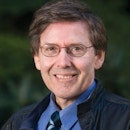Genomic Insights into Human Cortical Development and Neurodevelopmental Disease
- Speaker
-
 Arnold Kriegstein, Ph.D.Founding Director of the Broad Stem Cell Center, University of California, San Francisco
Arnold Kriegstein, Ph.D.Founding Director of the Broad Stem Cell Center, University of California, San Francisco
Presidential Lectures are free public colloquia centered on four main themes: Biology, Physics, Mathematics and Computer Science, and Neuroscience and Autism Science. These curated, high-level scientific talks feature leading scientists and mathematicians and are intended to foster discourse and drive discovery among the broader NYC-area research community. We invite those interested in the topic to join us for this weekly lecture series.
By clicking to watch this video, you agree to our privacy policy.
The developing human cortex contains a massively expanded outer subventricular zone, not found in rodents, that contains neural progenitor cells responsible for an evolutionary increase in cortical size and complexity. Transcriptome profiling of these cells has provided a novel model of primate corticogenesis and provided insights into lissencephaly (smooth brain syndrome) and microcephaly (smaller than normal brain size).
In this lecture, Dr. Arnold Kriegstein will describe recent advances in our understanding of the unique features of human cortical development. He will highlight an evolutionary increase in the number of a specific subtype of neural stem cell, oRG cells, which in concert with their transit amplifying daughter cells, contributed to increased cortical size and complexity of the human brain. He will also describe how mRNA sequencing of single human progenitor cells and immature cortical neurons led to a novel model of human cortical development and provided insights into the origins of neurodevelopmental disease.
